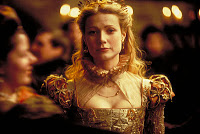Long-time readers of the blog know my special love for The Tempest, my excitement over the recent movie version by Julie Taymor, and my eventual crushing disappointment that followed. I can’t begin to link to all the stories on those subjects over the years.
But that was then and this is now, and I’ve got a copy of the DVD here at home and I’m walking the kids through it in these little 10 minute before-you-go-to-bed bursts. They don’t understand a word of it, and they tell me. And I’m ok with that, because I’m standing right there explaining to them, in these 10 minute chunks, precisely what’s going on.
Last night it dawned on me that I’d stumbled across what I’ll call the “mute and pause” teaching method. Specifically we were watching the scene where Gonzalo and Alonso have suddenly fallen asleep, and Antonio and Sebastian plot to kill them. I mute the scene, since the kids aren’t getting the words at all.
“You see that guy? He’s the real bad guy. He’s here thinking, hey, the king’s asleep, his son’s dead, nobody else is around … he’s telling his friend, if we kill the king, then you can be king! His friend here, he’s more of a medium bad guy, he’s not the kind of guy that thinks of that first. But when somebody plants the idea in his brain he’s all Yeahhhh…..*I* could be king! Good idea!”
You can’t do this with a book, or a retelling, or even a stage play. From a child’s perspective, that scene is long. They talk a lot. If you’re forced to sit through that, or read that, and you don’t understand it? Sure, I can see where it’s confusing and boring. So what we get in my house is we get to *see* it, we get to see the bad guy’s face and how he pulls his friend aside and whispers conspiratorial thoughts in his ear, all while getting the high level summary of what’s going on. So they get more than just “story and character”, they get a visual to go along with it. We bridge that gap toward “Shakespeare must be seen, not read!” Seeing goes a long way toward understanding, I agree completely. But not the whole way. So why not help the kids along?
Even better than the mute option is the pause option. *Click* pause. “See that, kids? See how Ariel has frozen time for a second? Ariel knows that Gonzalo – the nice man with the gray hair, who won’t stop talking? He’s Prospero’s friend from a long time ago. Ariel sees that there’s trouble, and he knows that Prospero would want his friend to be protected, so Ariel’s about to foil the bad guys’ plans.” *Click* resume.
I could *never* do that for a stage performance. In the time it took me to lean over my seat and try to whisper that explanation, the scene will have progressed and we’d never catch up. But when reading it, you don’t get that great tension of exactly how close it is, how they’ve got their swords up and ready to strike right at the moment Ariel wakes them.
One last thing, I’d also like to point out that I’m not just sacrificing the text in my muting and fast forwarding. I’m just picking my spots. For instance they got to hear the whole introduction of Trinculo and Caliban, and for the most part they understood it (and laughed their behinds off).
Today’s lesson, though, was about Gonzalo. “Watch for something, kids. You know the white haired guy that won’t shut up? He’s a good and loyal friend, and that’s a big deal. Even though he’s in with the bad guys, he’s a good guy. When they kicked Prospero and Miranda out of the kingdom and stuck them in the boat? It was Gonzalo who put the food and water and most importantly Prospero’s magic books into the boat with them. You know how Gonzalo is a good guy? Because when the king falls asleep, you’ve got these two other guys over here whose first thoughts are let’s kill him and become king! But good old Gonzalo, who is really pretty old to be doing any fighting, when Ariel wakes him up watch this – his very first words aren’t ‘Holy cow I fell asleep!’ or “What’s going on?” or anything, his very first thought is “Preserve the king!” So that’s how you know that he’s a good guy. That’s the guy you want on your team.”
In any other context you might completely miss that line. But once your attention is called to it, it’s a very important character trait. At least, in my humble opinion. 🙂




